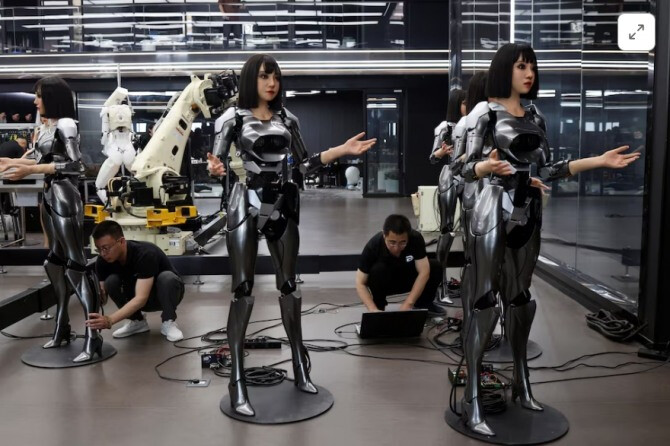
Concerns are mounting that the United States' humanoid robotics industry could fall behind China due to tariffs imposed during the Trump administration. This apprehension is increasingly justified as China accelerates its humanoid robot production, a move that directly correlates with artificial intelligence (AI) development through extensive data collection.
According to a report by market research firm TrendForce, as cited by the South China Morning Post on May 21st, six Chinese robotics manufacturers are poised to produce over 1,000 humanoid robots this year. Companies spearheading this surge include Unitree Robotics, AgiBot, Galbot, Engine AI, and Leju Robotics. These firms are expected to ship humanoid robots totaling 4.5 billion yuan (approximately $620 million).
While the revenue figures may seem modest, the implications are significant. The establishment of a robust supply chain, including numerous component manufacturers for humanoid robots, is a critical advantage. This comprehensive ecosystem is notoriously difficult for other nations to replicate. Furthermore, the widespread deployment of these robots will generate a massive dataset, giving China a potential edge in AI development. Data is paramount for training sophisticated robot AI, and its acquisition is both costly and challenging.
The United States has traditionally been perceived as leading in software development, despite trailing China in hardware manufacturing. However, the Trump-era tariffs, which restrict the import of robot components from China, have created an opportunity for China to accelerate its AI development. This shift could potentially erode the US's competitive edge.
TrendForce also commented on the world's first robot half-marathon held in Beijing, labeling it as an event that "highlighted the technological challenges facing the Chinese industry." Despite its intent to showcase China's advancements in humanoid robotics, only six of the 21 participating robots completed the race, revealing existing technological limitations.
Nevertheless, China continues to host events to demonstrate its robotic capabilities. From May 24th, the Chinese Institute of Electronics (CIE) will host a comprehensive robot sports competition in Wuxi, Jiangsu Province. This event will feature major Chinese robotics companies, including Unitree Robotics, AgiBot, Xiaomi Robotics, and UBTech, competing in various sports such as sprints, long-distance running, soccer, and basketball, alongside intelligent tasks like navigation.
The strategic importance of these events extends beyond mere technological display. China is actively fostering a domestic market for humanoid robots, driven by government initiatives and substantial investments. This approach contrasts with the US, where the industry faces hurdles due to trade tensions and a less cohesive national strategy.
China's focus on data collection is pivotal. The deployment of numerous robots across diverse environments will generate a wealth of real-world data, crucial for refining AI algorithms. This data-centric approach could enable China to develop more adaptable and intelligent humanoid robots, potentially outpacing the US in practical applications.
Moreover, China's manufacturing prowess provides a significant advantage. Its ability to mass-produce high-quality robot components at competitive prices ensures a steady supply chain, a critical factor for scaling up production.
In conclusion, while the US still maintains a lead in certain AI domains, the combination of Trump-era tariffs and China's aggressive manufacturing and data-driven approach poses a significant threat. The upcoming years will be critical in determining whether the US can maintain its competitive edge in the rapidly evolving field of humanoid robotics.
[Copyright (c) Global Economic Times. All Rights Reserved.]






























